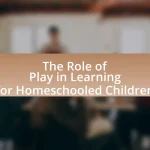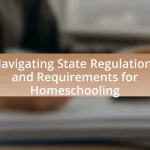The article focuses on managing sibling dynamics during homeschooling, highlighting key challenges such as competition for parental attention, differing learning paces, and conflicts over shared resources. It examines how sibling relationships impact the homeschooling environment, influencing collaboration, motivation, and emotional support. The article outlines common conflicts, the effects of sibling rivalry on learning outcomes, and the importance of effective management strategies. Additionally, it provides practical tips for fostering cooperation, resolving conflicts, and creating a balanced learning environment, emphasizing the role of positive interactions and structured routines in enhancing the homeschooling experience.

What are the key challenges of sibling dynamics during homeschooling?
The key challenges of sibling dynamics during homeschooling include competition for parental attention, differing learning paces, and conflicts over shared resources. Competition for parental attention can lead to feelings of jealousy and resentment among siblings, as they may perceive that one sibling receives more support or recognition. Differing learning paces can create frustration, as faster learners may feel held back, while slower learners may feel overwhelmed. Conflicts over shared resources, such as study materials or workspace, can further exacerbate tensions, leading to disputes that disrupt the learning environment. These challenges can hinder effective homeschooling and require proactive management strategies to ensure a harmonious educational experience.
How do sibling relationships impact the homeschooling environment?
Sibling relationships significantly impact the homeschooling environment by influencing collaboration, motivation, and emotional support among children. Positive sibling interactions can enhance learning experiences, as siblings often engage in cooperative learning, share knowledge, and provide encouragement, which fosters a supportive educational atmosphere. Conversely, negative sibling dynamics, such as rivalry or conflict, can lead to distractions and hinder the learning process, making it essential for parents to actively manage these relationships. Research indicates that siblings play a crucial role in each other’s educational outcomes, with studies showing that children with supportive sibling relationships tend to perform better academically and exhibit higher levels of social competence.
What common conflicts arise between siblings during homeschooling?
Common conflicts that arise between siblings during homeschooling include competition for parental attention, differing learning paces, and disagreements over shared resources. Siblings often vie for their parent’s focus, leading to feelings of jealousy or resentment, especially if one child perceives that the other receives more support. Additionally, when siblings have varying academic abilities, frustration can occur if one child feels held back or overwhelmed by the pace set for the group. Conflicts can also stem from disputes over materials, such as books or technology, which can lead to arguments about fairness and sharing. These dynamics are frequently observed in homeschooling environments, where the close quarters and shared learning experiences amplify typical sibling rivalry.
How can sibling rivalry affect learning outcomes?
Sibling rivalry can negatively impact learning outcomes by creating a competitive environment that distracts from academic focus. When siblings compete for attention, resources, or parental approval, it can lead to increased stress and anxiety, which are detrimental to effective learning. Research indicates that high levels of conflict among siblings can result in lower academic performance, as children may become more preoccupied with rivalry than with their studies. For example, a study published in the Journal of Family Psychology found that children who experience frequent sibling conflict tend to have lower grades and reduced motivation to engage in schoolwork.
Why is it important to manage sibling dynamics effectively?
Managing sibling dynamics effectively is crucial because it fosters a positive learning environment and enhances emotional well-being. When siblings interact harmoniously, they are more likely to support each other academically and socially, which is particularly important during homeschooling where structured social interactions may be limited. Research indicates that positive sibling relationships can lead to better conflict resolution skills and improved emotional regulation, which are essential for personal development. Furthermore, effective management of sibling dynamics can reduce distractions and conflicts, allowing for a more focused and productive homeschooling experience.
What are the long-term effects of unresolved sibling conflicts?
Unresolved sibling conflicts can lead to long-term emotional and relational issues, including increased anxiety, depression, and difficulties in forming healthy relationships. Research indicates that siblings who experience ongoing conflict may struggle with trust and communication in adulthood, impacting their social interactions and emotional well-being. A study published in the Journal of Family Psychology found that unresolved sibling rivalry can contribute to lower self-esteem and higher levels of interpersonal conflict later in life, demonstrating the lasting impact of these early relationships.
How can positive sibling relationships enhance the homeschooling experience?
Positive sibling relationships can significantly enhance the homeschooling experience by fostering collaboration and mutual support in learning. When siblings maintain a positive bond, they are more likely to engage in cooperative learning activities, which can lead to improved academic outcomes. Research indicates that children who work together on educational tasks develop better problem-solving skills and retain information more effectively. For instance, a study published in the Journal of Educational Psychology found that collaborative learning among siblings can enhance motivation and engagement, leading to a more enriching homeschooling environment.

What strategies can be employed to manage sibling dynamics during homeschooling?
To manage sibling dynamics during homeschooling, parents can implement structured routines, establish clear roles, and encourage cooperative learning. Structured routines provide predictability, which helps siblings understand when to focus on individual tasks and when to collaborate. Establishing clear roles allows each sibling to have specific responsibilities, reducing conflicts over tasks and promoting accountability. Encouraging cooperative learning, such as joint projects or study sessions, fosters teamwork and strengthens relationships. Research indicates that siblings who engage in collaborative activities develop better social skills and emotional intelligence, which are crucial for effective communication and conflict resolution.
How can parents foster cooperation among siblings?
Parents can foster cooperation among siblings by establishing clear expectations and encouraging teamwork through shared tasks. Setting specific family rules regarding behavior and responsibilities helps siblings understand their roles, while assigning collaborative projects, such as group assignments or household chores, promotes unity. Research indicates that children who engage in cooperative activities develop better social skills and conflict resolution abilities, which reinforces the importance of teamwork in family dynamics.
What role does setting clear expectations play in sibling interactions?
Setting clear expectations plays a crucial role in sibling interactions by establishing guidelines that promote understanding and cooperation. When siblings know what is expected of them, it reduces confusion and potential conflicts, fostering a more harmonious environment. Research indicates that clear communication of expectations can lead to improved relationships among siblings, as it helps them navigate shared responsibilities and activities more effectively. For instance, a study published in the Journal of Family Psychology found that siblings who engage in open discussions about their roles and responsibilities report higher satisfaction in their relationships.
How can collaborative learning activities benefit sibling relationships?
Collaborative learning activities can enhance sibling relationships by fostering teamwork and communication skills. When siblings engage in joint tasks, they learn to share responsibilities, negotiate roles, and support each other, which strengthens their bond. Research indicates that cooperative learning environments promote positive interactions and reduce conflicts among peers, including siblings. For instance, a study published in the Journal of Educational Psychology found that children who participated in collaborative learning showed improved social skills and increased empathy towards one another. This evidence supports the notion that collaborative learning not only aids academic achievement but also cultivates healthier sibling dynamics.
What techniques can help resolve conflicts between siblings?
Techniques that can help resolve conflicts between siblings include open communication, active listening, and mediation. Open communication allows siblings to express their feelings and perspectives without fear of judgment, fostering understanding. Active listening involves paying attention to each other’s viewpoints, which can help de-escalate tensions. Mediation, whether by a parent or a neutral third party, can facilitate a constructive dialogue and guide siblings toward a mutually acceptable solution. Research indicates that these techniques promote emotional intelligence and conflict resolution skills, essential for healthy sibling relationships.
How can effective communication strategies be implemented?
Effective communication strategies can be implemented by establishing clear guidelines for interaction among siblings during homeschooling. This involves setting specific times for discussions, encouraging active listening, and promoting respectful dialogue. Research indicates that structured communication improves understanding and reduces conflicts; for instance, a study published in the Journal of Family Psychology found that families who practiced regular communication routines reported higher satisfaction and lower levels of conflict. By fostering an environment where siblings feel safe to express their thoughts and emotions, effective communication can enhance collaboration and reduce misunderstandings in a homeschooling setting.
What conflict resolution methods are most effective for siblings?
Effective conflict resolution methods for siblings include open communication, mediation, and collaborative problem-solving. Open communication allows siblings to express their feelings and perspectives, fostering understanding and empathy. Mediation involves a neutral third party, such as a parent, to facilitate discussions and help siblings reach a mutually acceptable solution. Collaborative problem-solving encourages siblings to work together to find solutions that satisfy both parties, promoting teamwork and reducing hostility. Research indicates that these methods can lead to improved relationships and conflict management skills among siblings, as they learn to navigate disagreements constructively.

What are some practical tips for maintaining harmony among siblings during homeschooling?
To maintain harmony among siblings during homeschooling, establish clear roles and responsibilities for each child. This structure helps prevent conflicts by ensuring that each sibling knows their tasks and expectations. Additionally, implement regular breaks and family activities to foster bonding and reduce stress, as studies show that shared experiences can enhance sibling relationships. Encourage open communication by creating a safe space for siblings to express their feelings and resolve disputes, which is crucial for emotional development. Lastly, recognize and celebrate individual achievements to promote a sense of fairness and appreciation among siblings, reinforcing positive interactions.
How can parents create a balanced learning environment for siblings?
Parents can create a balanced learning environment for siblings by establishing clear roles and responsibilities for each child during homeschooling. This approach ensures that each sibling has designated tasks that cater to their individual strengths and learning styles, promoting a sense of ownership and accountability. Research indicates that when children are given specific roles, such as a “teacher’s assistant” or “study buddy,” they engage more actively in the learning process, which enhances their educational experience. Additionally, incorporating regular breaks and collaborative activities can foster teamwork and reduce competition, further contributing to a harmonious learning atmosphere.
What scheduling techniques can help minimize conflicts?
Effective scheduling techniques that can help minimize conflicts among siblings during homeschooling include staggered schedules, designated quiet times, and collaborative planning. Staggered schedules allow siblings to engage in different activities at varying times, reducing competition for resources and attention. Designated quiet times create a structured environment where siblings can focus on independent work without distractions, fostering a sense of personal space. Collaborative planning involves siblings working together to create a shared schedule, promoting ownership and reducing friction over time allocation. Research indicates that structured routines can enhance cooperation and reduce conflicts among children, supporting the effectiveness of these techniques in a homeschooling context.
How can individualized learning plans support sibling dynamics?
Individualized learning plans can support sibling dynamics by addressing each child’s unique learning needs and preferences, thereby reducing competition and fostering collaboration. When siblings have tailored educational approaches, they can focus on their strengths and weaknesses without feeling overshadowed by one another. Research indicates that personalized learning can enhance motivation and engagement, which can lead to a more harmonious learning environment. For example, a study published in the Journal of Educational Psychology found that individualized instruction significantly improved student satisfaction and reduced behavioral issues among peers. This tailored approach allows siblings to work together on projects that align with their interests, promoting teamwork and mutual support.
What activities can promote positive sibling interactions during homeschooling?
Engaging in collaborative projects can promote positive sibling interactions during homeschooling. Activities such as joint art projects, science experiments, or group reading sessions encourage teamwork and communication. Research indicates that siblings who participate in shared tasks develop stronger bonds and improve their conflict resolution skills, enhancing their overall relationship. For instance, a study published in the Journal of Family Psychology found that cooperative play among siblings leads to increased empathy and understanding, which are crucial for fostering positive interactions.
How can group projects enhance teamwork among siblings?
Group projects can enhance teamwork among siblings by fostering collaboration and communication skills. When siblings work together on a project, they must share responsibilities, negotiate roles, and solve problems collectively, which strengthens their ability to work as a team. Research indicates that collaborative learning environments improve interpersonal skills and promote a sense of belonging, which is crucial for sibling relationships. For instance, a study published in the Journal of Educational Psychology found that students who engaged in group work demonstrated higher levels of cooperation and conflict resolution skills compared to those who worked independently. This evidence supports the idea that group projects not only enhance teamwork but also contribute to healthier sibling dynamics during homeschooling.
What role do family bonding activities play in sibling relationships?
Family bonding activities significantly enhance sibling relationships by fostering communication, cooperation, and emotional support. Engaging in shared experiences, such as family game nights or outdoor adventures, helps siblings develop a sense of belonging and strengthens their emotional ties. Research indicates that siblings who participate in regular bonding activities report higher levels of satisfaction in their relationships, as these activities promote positive interactions and reduce conflicts. For instance, a study published in the Journal of Family Psychology found that siblings who engage in cooperative play are more likely to exhibit empathy and understanding towards each other, leading to healthier long-term relationships.
What are the best practices for parents to follow in managing sibling dynamics?
To effectively manage sibling dynamics, parents should establish clear communication and set consistent boundaries. Open dialogue encourages siblings to express their feelings and resolve conflicts constructively. Consistent boundaries help siblings understand acceptable behavior and foster a sense of security. Research indicates that children who engage in regular communication with their parents exhibit better emotional regulation and conflict resolution skills. Additionally, parents should promote teamwork through collaborative activities, which can strengthen sibling relationships and enhance cooperation. Studies show that siblings who work together on tasks develop stronger bonds and improve their social skills.










